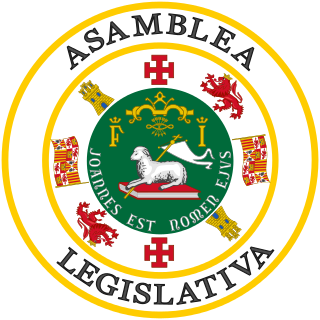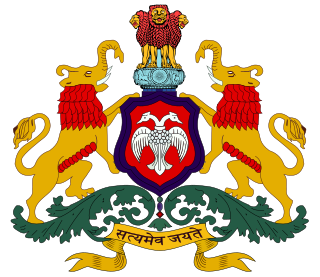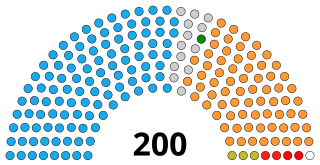Related Research Articles
Reddiar is a Telugu speaking land owning, merchants, agricultural social group in Tamil Nadu and Pondicherry.

The Legislative Assembly of Puerto Rico is the territorial legislature of the Commonwealth of Puerto Rico, responsible for the legislative branch of the government of Puerto Rico. The Assembly is a bicameral legislature consisting of an upper house, the Senate normally composed of 27 senators, and the lower house, the House of Representatives normally consisting of 51 representatives. Eleven members of each house are elected at-large rather than from a specific legislative district with all members being elected for a four-year term without term limits.

Ambika Chakrabarty was an Indian independence movement activist and revolutionary. Later, he was a leader of the Communist Party of India and a member of the West Bengal Legislative Assembly.

Tamil Nadu Legislative Council was the upper house of the former bicameral legislature of the Indian state of Tamil Nadu. It began its existence as Madras Legislative Council, the first provincial legislature for Madras Presidency. It was initially created as an advisory body in 1861, by the British colonial government. It was established by the Indian Councils Act 1861, enacted in the British parliament in the aftermath of the Indian Rebellion of 1857. Its role and strength were later expanded by the second Council Act of 1892. Limited election was introduced in 1909. The Council became a unicameral legislative body in 1921 and eventually the upper chamber of a bicameral legislature in 1937. After India became independent in 1947, it continued to be the upper chamber of the legislature of Madras State, one of the successor states to the Madras Presidency. It was renamed as the Tamil Nadu Legislative Council when the state was renamed as Tamil Nadu in 1969. The Council was abolished by the M. G. Ramachandran administration on 1 November 1986. In 2010 the DMK regime headed by M. Karunanidhi tried to revive the Council. The former AIADMK regime (2016-2021) expressed its intention not to revive the council and passed a resolution in the Tamil Nadu Legislative Assembly in this regard.

Nandamuri Harikrishna was an Indian actor, producer, and politician. He served as the Member of Parliament in the Rajya Sabha, the upper house the Indian Parliament representing the Indian state of Andhra Pradesh from 2008 to 2013 and a member of the Andhra Pradesh Legislative Assembly from 1996-1999. His film works were predominantly in Telugu cinema. Harikrishna was the fourth son of actor and former chief minister of Andhra Pradesh, N. T. Rama Rao. His sons N. T. Rama Rao Jr. and Nandamuri Kalyan Ram are actors and daughter Nandamuri Venkata Suhasini is a politician.

The Karnataka Legislative Assembly is the lower house of the bicameral legislature of the southern Indian state of Karnataka. Karnataka is one of the six states in India where the state legislature is bicameral, comprising two houses: the Vidhan Sabha and the Vidhan Parishad . There are 224 Members of the Legislative Assembly (MLAs) and are directly elected by people through adult franchise. Karnataka is thus divided into 224 constituencies to elect members to the Assembly, each constituency electing one member. The assembly is elected using the simple plurality or "first past the post" electoral system. The elections are conducted by the Election Commission of India.
Udupi Lok Sabha constituency was a former Lok Sabha constituency in Karnataka. This seat came into existence in 1957. With the implementation of the delimitation of parliamentary constituencies in 2008, it ceased to exist.

P. Kakkan or fondly known as Kakkan, was an Indian politician and freedom fighter who served as a member of the Constituent Assembly of India, Member of Parliament, President of the Tamil Nadu Congress Committee and in various ministerial posts in Congress governments in the erstwhile Madras state between 1957 and 1967.

The Uttar Pradesh Legislative Council also known as Uttar Pradesh Vidhan Parishad is the upper house of the bicameral legislature of Uttar Pradesh, a state in India. Uttar Pradesh is one of the six states in India, where the state legislature is bicameral, comprising two houses: the Vidhan Sabha and the Vidhan Parishad. The Vidhan Parishad is a permanent House, consisting of 100 members.

The Uttar Pradesh Legislative Assembly also known as Uttar Pradesh Vidhan Sabha is the lower house of the bicameral legislature of Uttar Pradesh. There are 403 seats in the house filled by direct election using a single-member first-past-the-post system.

The Bihar Legislative Assembly also known as the Bihar Vidhan Sabha is the lower house of the bicameral Bihar Legislature of the state of Bihar in India. The first state elections were held in 1952.

The Central Legislative Assembly was the lower house of the Imperial Legislative Council, the legislature of British India. It was created by the Government of India Act 1919, implementing the Montagu–Chelmsford Reforms. It was also sometimes called the Indian Legislative Assembly and the Imperial Legislative Assembly. The Council of State was the upper house of the legislature for India.

The first legislative assembly Election to the Madras state based on universal adult suffrage was held in March 1952. This was the first election held in Madras state after the Indian Independence. This election was officially known as the 1951 Madras State Election, even though through delays, actual voting didn't take place until early 1952.

The Tamil Nadu Legislative Assembly is the unicameral legislature of the Indian state of Tamil Nadu. It has a strength of 234 members, all of whom are democratically elected using the first-past-the-post system. The presiding officer of the Assembly is the Speaker. The term of the Assembly is five years, unless dissolved earlier.

S. Damodaran is an Indian politician and was a Member of the Legislative Assembly of Tamil Nadu.
The Patiala and East Punjab States Union Legislative Assembly was the unicameral state-level legislative body of the Patiala and East Punjab States Union in India. Two elections to the assembly were held; one in 1951 and the second one in 1954. The assembly had 60 seats. The assembly used to meet at the Durbar (Court) of Qila Mubarak, the royal fort at Patiala.

The Rajasthan Legislative Assembly or the Rajasthan Vidhan Sabha is the unicameral legislature of the Indian state of Rajasthan.
South Kanara (North) Lok Sabha constituency was a former Lok Sabha constituency in Madras State. This seat came into existence in 1951. With the implementation of States Reorganisation Act, 1956, it ceased to exist.